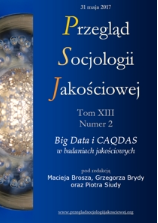CAQDAS w badaniach digitalizacji i odbioru dziedzictwa kulturowego. Korzyści i ograniczenia
CAQDAS in the Research Project on the Digitalization and Reception of Cultural Heritage. Advantages and Constraints
Author(s): Mariusz DzięglewskiSubject(s): Museology & Heritage Studies, Methodology and research technology, ICT Information and Communications Technologies
Published by: Uniwersytet Łódzki - Wydział Ekonomiczno-Socjologiczny
Keywords: CAQDAS; In-Depth Interviews; Content Analysis;
Summary/Abstract: The paper is aimed at the reflection on advantages and constraints emerging from the mutual diffusion of traditional research methods with computer assisted qualitative data analysis. The article includes critical analysis of this process based on the research project “Digital practices and strategies of dissemination and reception of cultural heritage in Poland between 2004-2014.” In the first part of the paper, the main assumptions of the project are discussed with the special insight into the function and fusion of those two approaches at the stage of the research project conceptualization. The author of the paper discusses the impact of CAQDAS on the perception of the research problem and latter interpretation of findings. In the second part of the article, the fallowing stages of the research project are presented, with the special insight into the fusion of various approaches to the research at the stage of database construction, coding of textual data, analysis, data visualization, and interpretation of findings. The special attention has been paid to advantages and constraints of CAQDAS application to content analysis of legal documents and transcripts of in-depth individual interviews. The main outcome of such meta-analysis of the research process is the proposal of the most effective fusion of traditional and new methods of data analysis in complex research projects. We believe that such proposal enables one to make use of new technological opportunities in social research, avoid “pitfalls,” and overcome constraints embedded in CAQDAS.
Journal: Przegląd Socjologii Jakościowej
- Issue Year: XIII/2017
- Issue No: 2
- Page Range: 24-45
- Page Count: 22
- Language: Polish

